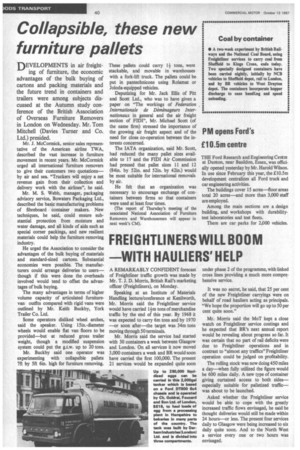FREIGHTLINERS WILL BOOM WITH HAULIERS' HELP
Page 42

If you've noticed an error in this article please click here to report it so we can fix it.
A REMARKABLY CONFIDENT forecast of Freightliner traffic growth was made by Mr. T. J. D. Morris, British Rail's marketing officer (Freightliners), on Monday.
Speaking at an Institute of Materials Handling lecture/conference at Kenilworth, Mr. Morris said the Freightliner service would have carried lfm tons of merchandise traffic by the end of this year. By 1968 it was expected to carry 6m tons and by 1970 —or soon after—the target was 34m tons moving through 50 terminals.
Mr. Morris said the service had started with 30 containers a week between Glasgow and London. On all services it now moved 3,000 containers a week and BR would soon have carried the first 100,000. The present 21 services would be expanded quite soon
under phase 2 of the programme, with linked cross lines providing a much more comprehensive service.
It was no secret, he said, that 25 per cent of the new Freightliner carryings were on behalf of road hauliers acting as principals. "We hope the proportion will go up to 50 per cent quite soon."
Mr. Morris said the MoT kept a close watch on Freightliner service costings and he expected that BR's next annual report would be revealing about progress so far. It was certain that no part of rail deficits were due to Freightliner operations and in contrast to "almost any traffics" Freightliner operation could be judged on profitability.
The rolling stock was now doing 450 miles a day—when fully utilized the figure would be 600 miles daily. A new type of container giving curtained access to both sides— especially suitable for palletized traffic— was about to be launched.
Asked whether the Freightliner service would be able to cope with the greatly increased traffic flows envisaged, he said he thought deliveries would still be made within 24 hours—or less. The present four services daily to Glasgow were being increased to six daily quite soon. And to the North West a service every one or two hours was envisaged.


































































































































